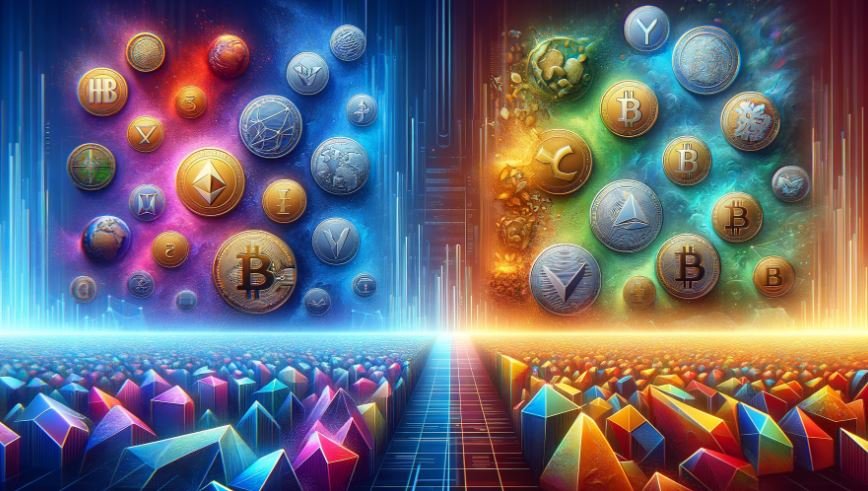Crypto
Altcoins and Stablecoins: Which One Do You Pick?

In the last few years, tens of coins have been getting into the crypto market. Most people are confused as to which coins to use for their regular transactions, which to invest in, and which to avoid. The coins in the market are either altcoins or stablecoins. The difference between the two determines what can and cannot be done with them. Let’s explore the difference and provide insights as to when you should hold either.
What is the Difference between Altcoins and Stablecoins?
Altcoins
Let’s start with altcoins, as they are the most popular cryptocurrencies. After the introduction of Bitcoin in 2009, several other coins cropped up as alternatives to Bitcoin. This is where the word ‘altcoin’ was coined. There are several altcoins today. Some are based on mining (which requires a process to generate blocks like Ethereum), others are utility tokens, and the final group is security tokens.
One characteristic of altcoins is that they have a structure similar to Bitcoin. You need a digital wallet to hold, buy and sell altcoins. They use a blockchain system that records and keeps the information of each transaction in a way that it cannot be deleted or manipulated.
Stablecoins
Many people are skeptical about buying altcoins, chiefly because they are highly volatile and price fluctuations may affect their investments. To solve these concerns, organizations developed stablecoins. Just as the name suggests, these coins were meant to deal with the volatility that comes with price fluctuations in altcoins.
They are based on hard fiat currencies or tradable items that do not fluctuate often or by huge margins. Major currencies such as the Euro, Pound, and Dollar, as well as commodities such as metals and precious stones, are fairly stable. Stablecoins are based on them.
The creators of stable currencies reserve assets that are worth the value of the coins. In most cases, the coin issuer gets a third-party organisation to hold the assets. Let’s take an example: Tether (USDT) is pegged to the US dollar at a ratio of 1:1. It is pegged to a central issuer, which is a bank that holds a specific amount of dollars with which it provides equal value of tokens.
What Unique Characteristics Do You Find in Each?
Altcoins are credited with creating a platform for creating decentralised finance (DeFi), an ecosystem that is expected to enhance financial inclusion around the globe. Here is an example: the Ethereum network enables users to access loans and earn some passive income from DeFi projects.
Stablecoins give users a chance to enjoy the features of both worlds. From digital currencies, stablecoins get security, privacy and the ability to be used around the globe. On the other hand, they get stability from fiat money. This means that they can be used as fiat money in their digital form.
When Should I Hold Either?
The choice of holding either is based on the intended use of the said coins. Here are some scenarios to consider.
When to Hold Altcoins
- When Considering Profit-Making Investments
If you are thinking of making investments with the aim of earning a profit, altcoins are the way to go. This is because the price moves regularly and by a wide margin at times. This means that the value increases at some point, making you a decent profit.
- Shorter and Speculative Investments
If you wish to make some quick cash in the crypto market, you may consider altcoins. As seen in the past, these coins get bursts of value. You can take advantage of this and then convert your cash to fiat money when the coin is at its peak.
There is a general theory that altcoins increase in value soon after Bitcoin performs better. It happens when Bitcoin rises and then stagnates. This makes most traders set their eyes on the movement of Bitcoin to make their moves. This period is called the alt season.
When to Hold Stablecoins
- Trading
As said earlier, stablecoins are used as a hedge against inflation. Therefore, they are more oriented towards the exchange of goods and services. It is more like trading in cash, but in digital form. If you wish to buy goods and services conveniently despite the problems that come with exchanges and currency conversions, they are your best choice.
- Leverage
There are margin protocols such as dYdX that give you a chance to use stablecoins as collateral and execute margin trades with a leverage of up to 5x. This allows traders to take short and long positions directly from their wallets, which is very convenient.
Why Do You Get High Interest in Stablecoins?
The reason why stablecoins have a high-interest rate is that the demand for stablecoins is usually higher than the supply of coins. What exceeds interest are the DeFi protocols, which eliminate problematic economic rents. The high interest also serves as an incentive for investors to provide liquidity. Exchanges have the security of value, so they are willing to have more lenders put their cash in them.
This is different from cryptocurrencies. Their price volatility makes them a riskier store of value. This lowers the interest rate to a fraction of many stablecoins.













